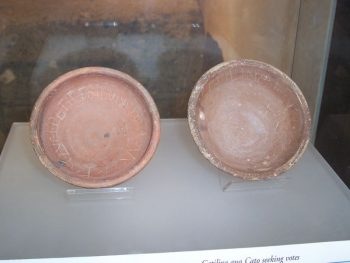Elections in Ancient Rome Posted by Brittany Britanniae on Nov 9, 2016 in Roman culture, Uncategorized
Chances are, no matter where you are, you have heard about the election in the United States. While the country is dealing with the results of their votes, we might want to ponder the history of elections and democracy that have influenced the makeup of the United States.

A coin depicting an Ancient Roman casting a vote. C. Cassius Longinus (issuer). 63 BC. AR Denarius (3.75 g, 4h). Rome mint. Attribution: Classical Numismatic Group, Inc. http://www.cngcoins.com. Courtesy of Wikimedia Commons.
Although the Romans are famous for the non-democratic tradition of their emperors, during the Republic, the Romans participated in voting on measures and offices. After the Romans overthrew their Etruscan rulers on 509 B.C.E. they established their Republic. The vote may not have held as much weight during Republican Rome as votes are typically believed to in modern times, but the influence of this Republic has reverberated into the present.
Starting with only two consul positions open for elections, the Republic ended with 44 offices open for election. Those who could vote were natural Roman males. This excluded women, slaves, and anyone not born in Rome. Although this severely limited the electorate, the sheer size of the Roman Empire have led historians to believe that, at one point, the electorate might have included up to 910,000 members.
The elections could be competitive and there were even propaganda strategies. One strategy was to offer food and drinks from bowls inscribed with a candidates name. These treats were offered on the street at the time of elections.

With the cup on the left, Marcus Porcius Cato (Cato the younger) asks (petit) to be elected Tribune of the plebs. The cup on the right was sponsored by Lucius Cassius Longinus (praetor with Cicero in 66 BC) to support (suffragatur) Lucius Sergius Catilina (Catilinae) bid for consulate. Courtesy of WIkimedia Commons.
However, expecting a majority of these voters to be able to attend votes, which lasted only about 5 hours in specific locations, was impossible. There are no sources that exist today to tell us what kind of turnout came to the vote, however, Juius Caesar had an attached onto the Campus Martius constructed to serve as a polling place.

Temple of Deified Hadrian (Hadrianeum), Campus Martius, Rome. Attribution: Carole Raddato from FRANKFURT, Germany. Courtesy of Wikimedia Commons.
This attachment, judging by its size, could have only held between 30,000 and 70,000 people. Historians believe that the range of 6,000 and 16,800 is a more realistic range given the needed space to collect physical votes. With an electorate at 910,000 this means than less that 10% of the Republic were voting on offices around this time.
Augustus, after Caesar, would maintain elections, but the men up for office were pre-selected. So, although the turnout was so small, the significance of those elections did not last very long after the construction of that polling place.
Sources:
Rachel Feig Vishnia. Roman Elections in the Age of Cicero: Society, Government, and Voting. Routledge, Mar 12, 2012.

Build vocabulary, practice pronunciation, and more with Transparent Language Online. Available anytime, anywhere, on any device.
About the Author: Brittany Britanniae
Hello There! Please feel free to ask me anything about Latin Grammar, Syntax, or the Ancient World.



